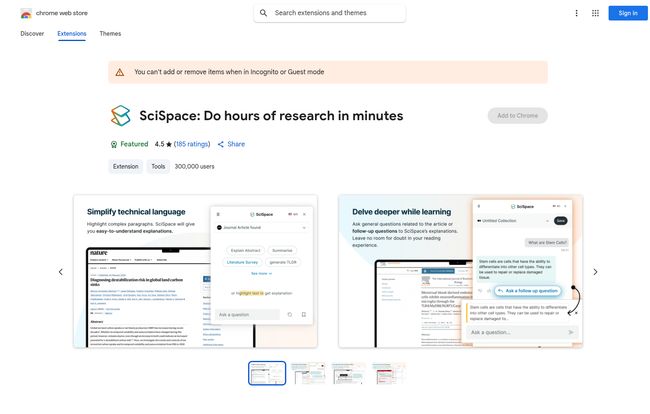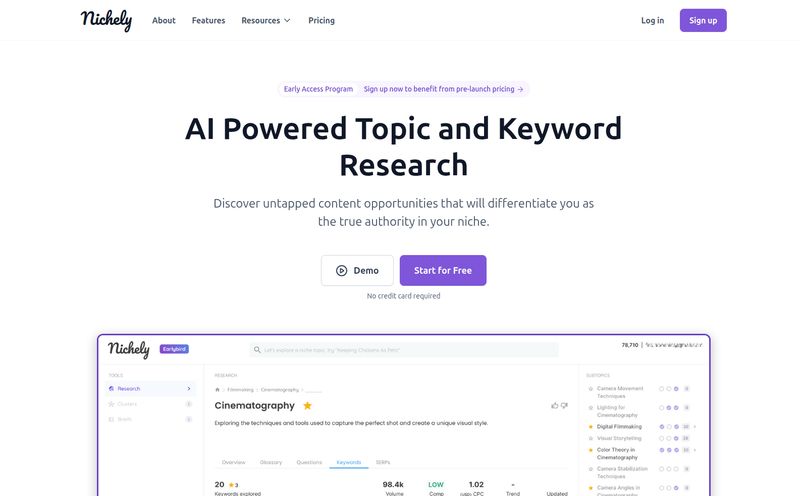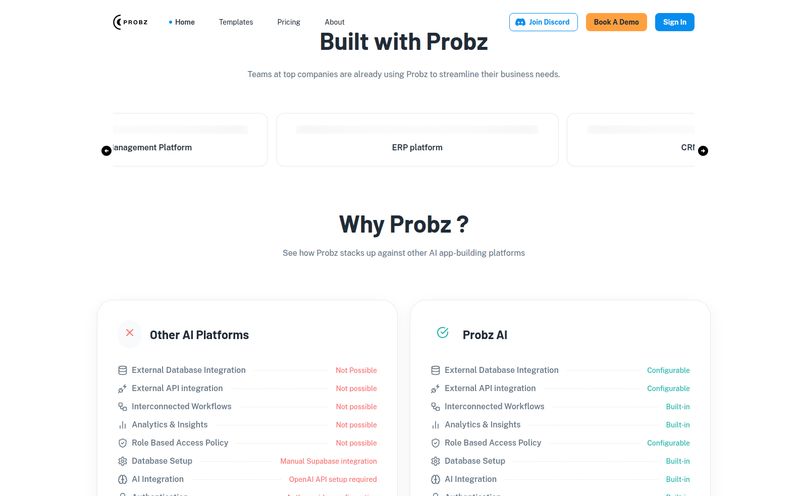Remember those all-nighters in college? The ones powered by lukewarm coffee and a mountain of PDFs for a literature review due at 8 AM? I do. Vividly. The sheer dread of opening a 40-page paper filled with jargon so dense it could form a black hole... yeah, not my fondest memory. For years, that was just the price of admission for anyone in academia or a research-heavy field like mine.
But things are changing. Fast. We're in the age of AI copilots, and they're coming for everything from writing code to, you guessed it, decimating those stacks of academic papers. I've been hearing a lot of buzz about one tool in particular: SciSpace. It bills itself as an "AI research assistant for understanding scientific literature." A bold claim. So, naturally, I had to see if it was the real deal or just another piece of overhyped vaporware.
So, What Exactly is SciSpace?
Let's break it down. At its core, SciSpace is a tool designed to make reading and understanding complex documents, especially scientific papers, way easier and faster. Think of it as a brilliant, infinitely patient TA who's available 24/7. You highlight a sentence that looks like it was written in Klingon, and it whispers a plain-English translation in your ear.
The promise on their Chrome Web Store page is "Do hours of research in minutes." As someone whose time is their most valuable asset, that’s a pretty compelling hook. It's not just about getting definitions; it’s about having a conversation with the research itself. You can ask follow-up questions, get summaries of sections, and even have it explain complex tables or mathematical equations. Pretty wild, right?

Visit SciSpace
My Favorite SciSpace Features (The Good Stuff)
Okay, so it talks a big game. But what can it actually do? I messed around with it for a while, and a few features really stood out as genuinely useful, not just gimmicky.
The Chrome Extension: Your Everywhere Research Assistant
I'm a sucker for good integration. I have enough tabs open as it is, and I don't want another platform to manage. The SciSpace Chrome extension is slick. You can be on a publisher’s site like Nature or arXiv.org, find a confusing passage, and get an explanation right there without switching screens. With over 300,000 users and a 4.5-star rating, it's clear I'm not the only one who appreciates this convenience. Its a simple thing, but it completely changes the workflow.
Chatting with Your PDFs
This is the feature that feels like magic. You can upload your own PDFs directly to SciSpace and then... just talk to them. I uploaded a recent study on Google's algorithm shifts, and instead of skimming for 20 minutes, I just asked, "What was the primary conclusion of this study regarding E-E-A-T?" and boom, I got a concise answer with citations pointing to the exact page. For vetting whether a paper is even worth reading, this is an absolute game-changer.
More Than Just Explanations
SciSpace isn't a one-trick pony. It also packs in a few other tools that researchers will love. There's a built-in citation generator, which saves you from the tedious task of formatting for APA, MLA, or whatever style you're forced to use. There's also a paraphrasing tool, which is handy for taking notes in your own words and avoiding any accidental plagiarism. It even has an AI detector, which is an interesting, if slightly ironic, addition.
Let's Get Real: The Downsides and Caveats
Alright, it can't all be sunshine and roses. As with any AI tool, there are some important things to keep in mind. This isn't a magic wand that makes you a research god overnight.
First off, can you trust it 100% of the time? No. And you shouldn't. I've always said that AI is a fantastic copilot, but you should never let it fly the plane alone. It can misunderstand nuance or oversimplify a critical point. Always use its explanations as a starting point to deepen your own understanding, not as the final, inarguable truth. Double-check its claims against the source text.
Then there's the bigger, more philosophical debate: the "dumbing down" argument. Some people worry that relying on tools like SciSpace will atrophy our critical thinking muscles. I see the point, but I don't fully agree. A calculator doesn't stop a mathematician from understanding theory; it just frees them from tedious arithmetic. In the same way, SciSpace can free you from the tedium of decoding jargon, allowing you to focus on the bigger picture—the methodology, the implications, the validity of the argument. It's all in how you use it.
What's the Damage? A Look at SciSpace Pricing
This is the million-dollar question, isn't it? Based on the information available, specific pricing tiers aren't clearly advertised on the Chrome store page. However, tools like this typically operate on a freemium model. You get a certain number of queries or features for free, which is great for casual users or for trying it out, and then you pay a monthly or annual subscription for unlimited access and premium features.
My advice? Head over to the official SciSpace website to get the most up-to-date information on their plans. The free version is likely more than enough to see if it fits into your workflow.
Conclusion: Is SciSpace Worth Your Time?
So, what's the verdict? In my experience, SciSpace is absolutely worth a look. For students buried in literature, PhD candidates trying to stay on top of their field, or even professionals like me who need to digest academic research to stay sharp, it's a massive time-saver. It lowers the barrier to entry for complex information, and that’s a powerful thing.
It’s not perfect, and it requires the user to stay engaged and critical. But as an AI research assistant, a copilot for your intellectual journey? Yeah, it’s one of the best I’ve seen. It's the tool I honestly wish existed back when I was pulling those coffee-fueled all-nighters. The kids have it so easy these days.
Frequently Asked Questions about SciSpace
- Is SciSpace free to use?
- SciSpace typically offers a free plan with certain limitations, like a cap on the number of questions you can ask. For heavy-duty use and advanced features, they offer paid premium subscriptions. It's best to check their official site for the latest details.
- Can SciSpace read and analyze any type of PDF?
- While it's optimized for scientific and academic papers, its language processing capabilities allow it to work with most text-based PDFs. It excels at parsing dense, structured documents, so your mileage may vary with things like novels or highly stylized marketing brochures.
- Is using a tool like SciSpace considered cheating?
- This is a great question. Using it to understand a concept is a study aid, much like a tutor or a study group. Using it to write your paper for you or to bypass the work of reading would likely violate academic integrity policies. The key is to use it to assist your learning, not replace it.
- How accurate are the explanations from SciSpace?
- They are generally very accurate for factual summarization and definition, but AI can sometimes miss subtle context or nuance. Think of it as 95% reliable. It's crucial to treat it as a guide and always refer back to the original text for critical assertions.
- Does the SciSpace Copilot only work for STEM fields?
- Not at all! While it's branded for "scientific literature," it's incredibly useful for any field with dense texts. Think legal scholarship, complex historical analysis, or philosophical treatises. If a document is long and full of jargon, SciSpace can probably help.



